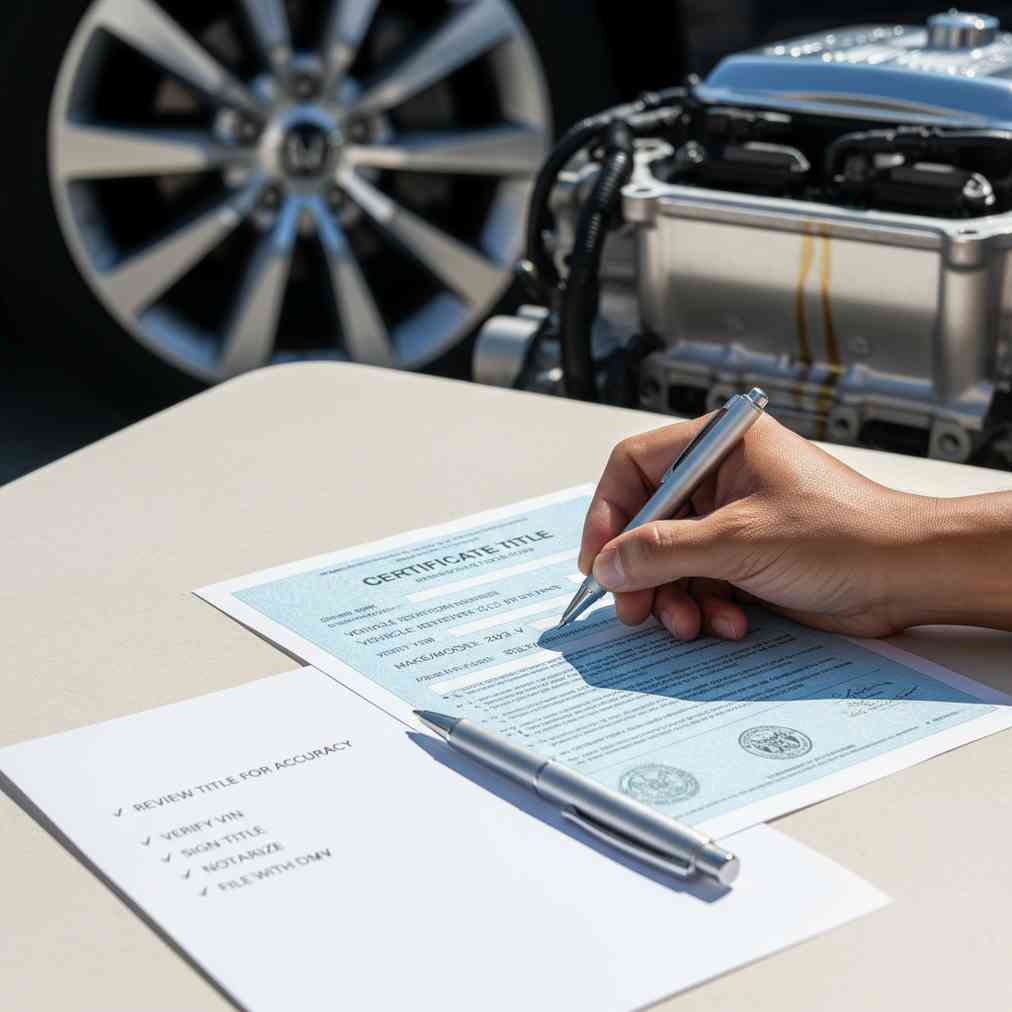Understanding the Vehicle Title: Your Most Important Document
When selling your car for cash, the vehicle title serves as the cornerstone of any legal transaction. This document, often referred to as a “pink slip,” provides irrefutable proof of ownership and enables you to legally transfer your vehicle to a buyer, salvage yard, or cash-for-cars service.
A vehicle title contains critical information including the Vehicle Identification Number (VIN), make, model, year, and the owner’s name. Without this document, you cannot complete a legal sale, which is why understanding title requirements is essential before selling your junk car.
What Makes a “Clear” Title
A “clear” title means there are no liens or other claims against the vehicle. If you still owe money on your car, the lender holds the title, and you’ll need to pay off the loan completely to obtain a clear title before selling. This process can take several days or weeks, so plan accordingly when preparing to sell your car for scrap.
Dealing with a Lost Title
If you’ve misplaced your title, don’t panic. You can apply for a duplicate title from your state’s Department of Motor Vehicles (DMV). This process typically involves:
- Completing a duplicate title application form
- Providing valid identification
- Paying the required fee (usually $15-$50)
- Waiting for processing (can take 1-4 weeks)
Some states offer expedited services for an additional fee. Certain junkyards may accept alternative documentation, but having the original title typically results in better offers.
Essential Paperwork for Cash Car Sales
Beyond the title, several other documents are crucial for completing a legal and protected transaction when selling your vehicle for cash. Having all required paperwork ready streamlines the process and protects both you and the buyer.
| Document | Purpose | Required by Law |
|---|---|---|
| Vehicle Title | Proof of ownership and legal transfer | Yes (in most cases) |
| Bill of Sale | Receipt and contract protection | Varies by state |
| Odometer Disclosure | Mileage verification (federal requirement) | Yes |
| Lien Release | Proof loan is paid off | If applicable |
Bill of Sale: Your Transaction Protection
While not always legally mandated, a bill of sale acts as both a receipt and contract, detailing crucial transaction information. This document should include:
- Purchase price and payment method
- Date of sale
- Vehicle identification number (VIN)
- Names, addresses, and signatures of both parties
- Vehicle description (make, model, year, mileage)
A properly executed bill of sale protects you from future liability related to the vehicle and serves as proof that the transaction occurred legally.
Odometer Disclosure Statement
Federal law mandates sellers disclose accurate vehicle mileage at the time of sale through an odometer disclosure statement. This requirement prevents odometer fraud and is typically integrated into the title transfer process or completed as a separate form.
Step-by-Step Checklist for Selling Your Car
Following a systematic approach ensures you complete all necessary steps legally and efficiently. This comprehensive checklist covers every aspect of selling a junk car properly:
Before the Sale
- Locate your vehicle title – Find the original or apply for a duplicate immediately
- Verify title status – Ensure no liens exist or obtain lien release documentation
- Gather supporting documents – Prepare bill of sale templates and odometer disclosure forms
- Remove personal belongings – Check thoroughly for items in glove compartments, trunks, and under seats
- Handle license plates – Check state regulations about plate removal and transfer
During the Transaction
When completing the actual sale, attention to detail prevents future complications:
- Fill out title information completely – Include buyer’s name, address, and don’t leave blank spaces
- Record accurate mileage – Double-check odometer reading for accuracy
- Complete bill of sale – Have both parties sign and date all documents
- Accept payment securely – Verify cash or certified payment before transferring ownership
- Make copies – Keep copies of all signed documents for your records
After the Sale
Proper post-sale procedures protect you from ongoing liability:
- Notify your state’s DMV – File a Notice of Transfer and Release of Liability form
- Contact your insurance company – Remove the vehicle from your policy
- Cancel registration – Follow state procedures for registration cancellation
- Store documentation – Keep all paperwork for at least one year
State-Specific Requirements and Regulations
Title and paperwork requirements vary significantly by state, making it crucial to understand your local regulations. Some states have unique requirements that can affect your sale process and timeline.
California Specific Requirements
California has particularly stringent requirements for vehicle sales. When junking a car in California, sellers must:
- Provide a valid California title or apply for a duplicate
- Complete a Notice of Transfer and Release of Liability (REG 138)
- Remove license plates before the transaction
- Provide smog certification for certain vehicles
The state also has specific provisions for revived junk and salvage vehicles that may affect your paperwork requirements.
Alternative Documentation Options
Some states allow alternative proof of ownership when the original title isn’t available. These may include:
| Alternative Document | Accepted States | Additional Requirements |
|---|---|---|
| Registration Certificate | Varies | Must be current and in seller’s name |
| Bill of Sale from Previous Owner | Limited | Often requires notarization |
| Court Order | Most states | For inherited or abandoned vehicles |
| Bonded Title | Select states | Requires surety bond purchase |
Expert Insights and Industry Best Practices
“The most common mistake sellers make is not having their title in order. A clear title is non-negotiable for a legal sale. If you’re unsure, contact your local DMV before you agree to sell.”
Sarah Miller, Legal Advisor specializing in consumer auto sales
Industry professionals emphasize that preparation prevents problems. Many reputable cash-for-cars services streamline their processes, but sellers remain ultimately responsible for providing proper documentation.
Current Industry Trends
The auto salvage industry continues evolving toward greater efficiency and customer service. Recent developments include:
- Digital documentation systems – Many states are moving toward electronic title transfers
- Streamlined processes – Salvage yards increasingly offer paperwork assistance
- Online services – Digital platforms make preliminary arrangements easier
- Enhanced verification – Improved fraud prevention through better documentation checks
These trends benefit sellers by reducing transaction times and complexity, though traditional paper documentation remains standard for most transactions, especially with older vehicles sold to salvage yards.
Common Mistakes to Avoid
Learning from others’ experiences can save time, money, and legal complications. Here are the most frequent errors sellers make when handling titles and paperwork:
Title-Related Errors
- Leaving blank spaces – Never leave sections of the title unfilled; this creates “title jumping” risks
- Signing before the buyer arrives – Only sign when the buyer is present with payment
- Not checking buyer information – Verify buyer details are complete and legible
- Forgetting about liens – Failing to clear liens before attempting to sell
Documentation Oversights
Beyond title errors, sellers frequently make these paperwork mistakes:
- Not notifying the DMV promptly after sale
- Failing to cancel insurance immediately
- Not keeping copies of all documents
- Providing inaccurate mileage information
- Forgetting to remove license plates where required
Maximizing Your Cash Offer
Having proper documentation not only ensures legal compliance but can also increase your vehicle’s value. Buyers and salvage yards often offer higher prices for vehicles with complete, organized paperwork because it reduces their risk and processing time.
Documentation That Adds Value
Beyond basic requirements, these additional documents can boost your offer:
- Maintenance records – Prove the vehicle was well-maintained
- Repair receipts – Document valuable parts or recent work
- Original purchase documentation – Establish complete ownership history
- Emissions certificates – Required in some areas, valuable in others
When avoiding scams while selling your car, complete documentation serves as protection against fraudulent buyers and ensures you receive fair market value.
Special Circumstances and Solutions
Not every car sale follows the standard process. Various special circumstances require different approaches to title and paperwork handling.
Inherited Vehicles
When selling an inherited vehicle, you’ll typically need:
- Death certificate of the previous owner
- Probate court documentation or affidavit
- Proof of your legal right to sell
- Original title (if available)
Vehicles with Multiple Owners
When multiple people are listed on the title, requirements vary based on how names appear:
| Title Format | Signature Requirement | Documentation Needed |
|---|---|---|
| Owner 1 AND Owner 2 | Both signatures required | Both owners must be present or provide notarized signatures |
| Owner 1 OR Owner 2 | Either signature acceptable | One owner can complete the sale independently |
| Owner 1/Owner 2 | Varies by state interpretation | Check with local DMV for specific requirements |
Final Steps and Follow-Up
Completing the sale transaction is only the beginning of your post-sale responsibilities. Proper follow-up protects you from future liability and ensures the transaction is fully legal and complete.
Immediate Post-Sale Actions
Within 24-48 hours of selling your vehicle, complete these essential steps:
- File DMV notification – Submit your Notice of Transfer form immediately
- Contact insurance provider – Remove the vehicle from your policy to stop premium charges
- Return license plates – Follow your state’s plate return or transfer procedures
- Organize documentation – Store all sale-related paperwork in a safe location
Long-Term Considerations
Monitor your situation for several weeks after the sale to ensure everything processes correctly:
- Verify DMV receives and processes your notification
- Confirm insurance cancellation and any refund due
- Watch for any tickets or violations that might indicate improper transfer
- Keep all documentation for at least one year after sale
Understanding these requirements and following proper procedures ensures your cash car sale proceeds smoothly and legally, protecting your interests while maximizing your return. Whether you’re working with a traditional junkyard or modern cash-for-cars service, proper documentation remains the foundation of any successful transaction.
For more information about automotive topics and salvage yard services, including finding valuable parts or understanding how salvage yards operate, explore additional resources to make informed decisions about your vehicle transactions.





Leave a Reply
You must be logged in to post a comment.